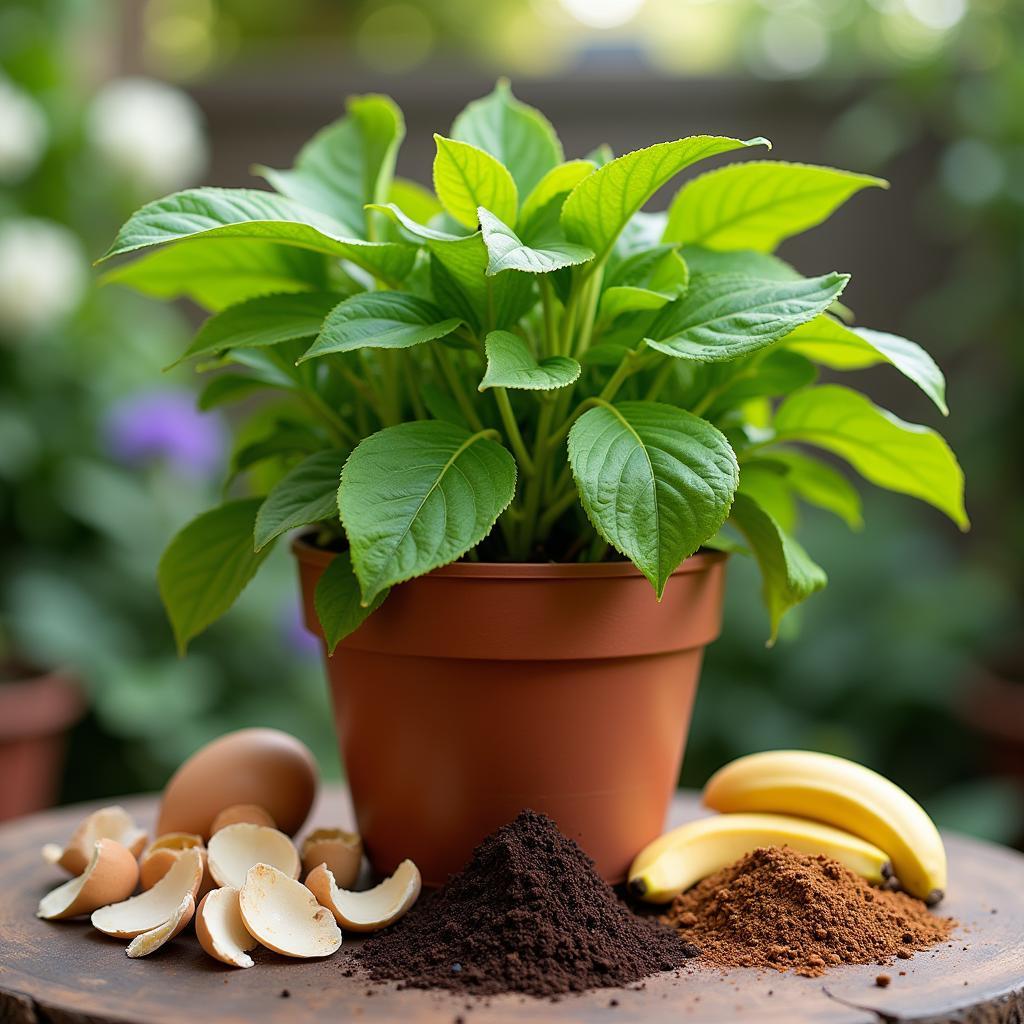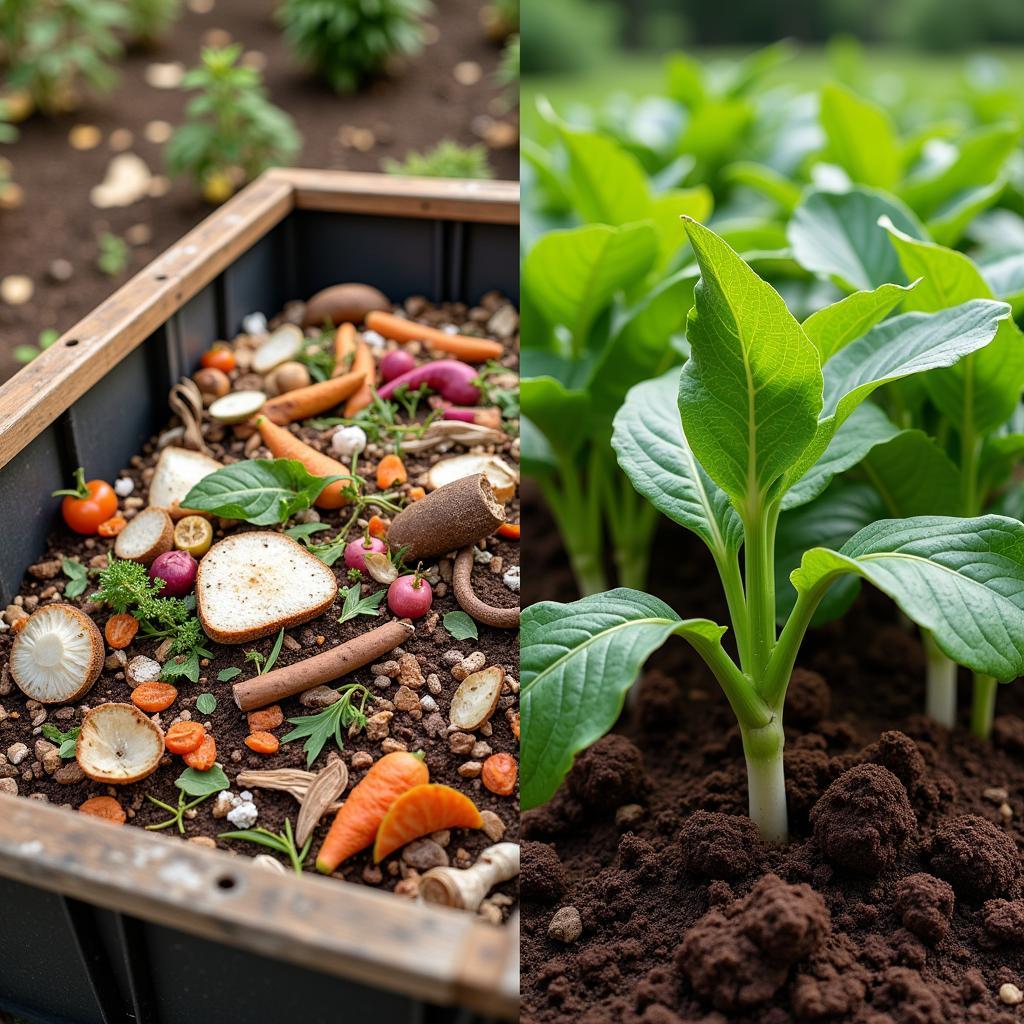Nitrogen-rich foods are essential for healthy plant growth. They provide the building blocks for chlorophyll, which plants use for photosynthesis, and promote vigorous foliage development. Understanding the role of nitrogen and how to provide it through various food sources is key to successful gardening. Let’s explore the best nitrogen-rich foods for your plants.
 Nitrogen-rich foods promote healthy plant growth by providing essential nutrients for photosynthesis and foliage development. The image depicts a variety of these foods, such as coffee grounds, banana peels, and manure, arranged around healthy, vibrant plants.
Nitrogen-rich foods promote healthy plant growth by providing essential nutrients for photosynthesis and foliage development. The image depicts a variety of these foods, such as coffee grounds, banana peels, and manure, arranged around healthy, vibrant plants.
Understanding the Importance of Nitrogen for Plant Growth
Nitrogen is a macronutrient, meaning plants need it in relatively large quantities. It’s a crucial component of chlorophyll, the pigment that gives plants their green color and enables them to convert sunlight into energy. Nitrogen deficiency can lead to stunted growth, yellowing leaves, and reduced yields. Providing adequate nitrogen is particularly important during the vegetative stage when plants are actively growing leaves and stems. Did you know that nitrogen is also a key element in amino acids, the building blocks of proteins? This highlights its vital role in overall plant health and development.
What happens when plants don’t receive enough nitrogen? Their growth slows significantly, leaves begin to yellow, and flowering and fruiting are reduced. Recognizing these signs early on is crucial for taking corrective action.
plant food vs plant fertilizer
Natural Sources of Nitrogen-Rich Foods
Fortunately, there are many natural ways to provide your plants with the nitrogen they need. These options are often more sustainable and can improve soil health over time.
- Compost: Composting kitchen scraps and yard waste creates a nutrient-rich soil amendment packed with nitrogen.
- Manure: Animal manure, especially from chickens and cows, is an excellent source of nitrogen. It’s important to compost manure thoroughly before using it to avoid burning plant roots.
- Coffee Grounds: Used coffee grounds contain a small amount of nitrogen and can be added directly to the soil or incorporated into compost.
- Grass Clippings: Fresh grass clippings are rich in nitrogen and can be used as a mulch or added to the compost pile.
Using natural nitrogen sources not only benefits your plants but also contributes to a healthier ecosystem. They enhance soil structure, improve water retention, and support beneficial microorganisms.
 Natural nitrogen sources like compost, manure, and coffee grounds are sustainable options for enriching garden soil and promoting healthy plant growth.
Natural nitrogen sources like compost, manure, and coffee grounds are sustainable options for enriching garden soil and promoting healthy plant growth.
Using Nitrogen-Rich Foods Effectively
How do you apply these nitrogen-rich foods effectively? Let’s explore some best practices:
- Compost Tea: Brewing compost tea extracts the nutrients and beneficial microbes from compost, making them readily available to plants.
- Top Dressing: Sprinkling compost or manure around the base of plants provides a slow-release source of nitrogen.
- Soil Incorporation: Mixing compost or manure into the soil before planting improves soil fertility and provides a long-term nitrogen supply.
Remember that too much nitrogen can be just as detrimental as too little. Over-fertilizing can lead to excessive leaf growth at the expense of flowers and fruits, and can also leach into waterways, causing pollution.
What are the signs of nitrogen deficiency in plants?
Stunted growth and yellowing leaves are the most common signs.
How often should I apply nitrogen-rich foods?
The frequency depends on the plant’s needs and the type of food used. Generally, applying compost or manure once or twice a year is sufficient.
Conclusion
Nitrogen-rich foods are crucial for robust plant growth. By understanding the importance of nitrogen and utilizing natural sources like compost, manure, and coffee grounds, you can ensure your plants thrive. Remember to apply these foods effectively and monitor your plants for signs of deficiency or excess. Utilizing these natural methods not only benefits your garden but also contributes to a more sustainable approach to gardening. Nitrogen-rich foods truly are the key to a bountiful and thriving garden.
plant food vs plant fertilizer
FAQ
- What is the best nitrogen-rich food for vegetables? Composted manure is generally excellent for vegetables.
- Can I use too much nitrogen? Yes, over-fertilizing can harm plants and the environment.
- Are coffee grounds good for all plants? While many plants benefit from coffee grounds, some acid-loving plants may thrive even more.
- How do I make compost tea? Soak compost in water for a few days, then strain and use the liquid to water plants.
- Is it necessary to compost manure before using it? Yes, composting manure helps break down harmful pathogens and prevents root burn.
- What are some other signs of nitrogen deficiency besides yellowing leaves? Stunted growth and poor fruit or flower production can also indicate a nitrogen deficiency.
- Where can I find more information on sustainable gardening practices? Many online resources and books offer valuable information on sustainable gardening.
Need further assistance? Contact us at Phone Number: 02437655121, Email: minacones@gmail.com Or visit us at: 3PGH+8R9, ĐT70A, thôn Trung, Bắc Từ Liêm, Hà Nội, Việt Nam. We have a 24/7 customer support team.